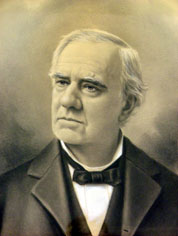Samuel F. Phillips
| Samuel Field Phillips | |
|---|---|

Samuel F. Phillips portrait.
|
|
| 2nd Solicitor General of the United States | |
|
In office November 1872 – May 1885 |
|
| Appointed by | Ulysses Grant |
| Preceded by | Benjamin H. Bristow |
| Succeeded by | John Goode |
| Personal details | |
| Born |
February 24, 1824 New York City, New York, US |
| Died | November 18, 1903 (aged 79) Washington, D.C., US |
| Resting place | Chapel Hill, North Carolina, US |
| Spouse(s) | Frances R. Lucas Sarah Maury |
| Alma mater | University of North Carolina at Chapel Hill |
Samuel Field Phillips (February 18, 1824 – November 18, 1903) was a civil rights pioneer, lawyer, politician, and the second U.S. Solicitor General (1872–1885). He took part in the landmark civil rights case, Plessy v. Ferguson.
Samuel Phillips was born in New York City. His father, James Phillips, was a British mathematician. When Samuel was about two years of age his father became the first professor of mathematics at the newly formed University of North Carolina at Chapel Hill (UNC) and the family moved to Chapel Hill, North Carolina.
Samuel Phillips graduated from UNC with highest honors in 1841, earning a master's degree three years later. He began his own law practice in North Carolina and joined the UNC law department as a tutor before embarking on a career in politics, beginning with his election as a Whig to the North Carolina General Assemblies of 1852 and 1854. Phillips served on North Carolina's state court of claims in 1861, and as state auditor from 1862-1864.
Phillips had been an opponent of secession and during the U.S. Civil War he became a member of the "Peace Party" of newspaper publisher William Woods Holden (1818–1892), whose 1863 "peace meetings" across North Carolina urged the state to stop fighting the Civil War.
In 1864, Phillips was re-elected to the General Assembly, serving as Speaker of the House in 1866. He was a member of the first "Reconstruction Convention," and joined the Republican Party, which earned him much condemnation as a "scalawag." He fought for the expansion of legal rights for African-Americans, triumphing in granting freedmen the right to testify in cases in which they were parties.
...
Wikipedia
